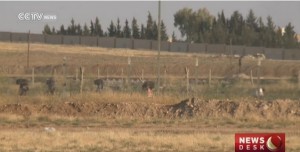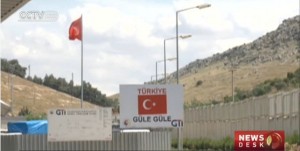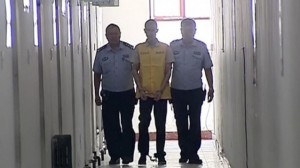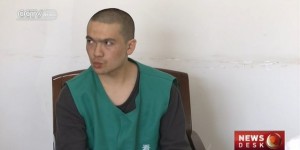The 25-year-old Memetili was an undergraduate student majoring in medical studies in a Xinjiang university. His relatively normal student life was completely changed when he was approached by people trying to teach him “religious knowledge.” The “textbooks,” however, were videos and audio guides made by terrorist organizations overseas.
“After watching them, we thought we should do hijra and jihad. We thought it was a good thing to fight for our religion and people. Even if we die, we die as a martyr. Everything we watched encouraged us to join jihad,” Memetili said.
“I thought we might go to Syria, Afghanistan, or Pakistan to join jihad,” he added.
Returning from terrorism: College student’s road to “Jihad migration”
As the only boy of four children, Memetili’s family was disappointed by his behavior.
“I wanted to escape that pressure. I told the people arranging my journey that I don’t have money. They told me not to worry and [to] depart immediately,” he said.

Returning from terrorism: College student’s road to “Jihad migration”
Memetili was on his way to joining the jihad. He was helped by a group to travel to southwest China, where he would make his illegal crossing.
“During the journey you must say you don’t have money. Because the smugglers will threaten you with knives. They’ll kill you if you don’t hand the money over,” Memetili said.
He also said that any clothes with Chinese writing, ID cards, and normal possessions should be gotten rid of.

Returning from terrorism: College student’s road to “Jihad migration”
“If you are arrested in Thailand, they’ll be able to tell you are from China from your clothes. Otherwise if they ask where you are from, you can say you are Turkish. It’s hard to tell our nationality. If nothing suspicious is found, those of us who have been arrested won’t be repatriated,” he said.

Returning from terrorism: College student’s road to “Jihad migration”
Being an ex-med student, Memetili was a sought-after candidate by the Eastern Turkistan Islam0c Movement, an international terrorist organization.
“People get injured during battles, and it takes a long time to train a person without medical knowledge to be a doctor. Battles are frequent so there are many injured. Besides weapons they need doctors most,” said Memetili.
But rather than advancing in his profession, only a sense of helplessness was later etched into his memory.
“Almost everyone got sick, especially women and children who were not accustomed to the climate. They went to hospitals and some got arrested. Some went out to buy drugs, but they didn’t work,” he said. “Some died and their bodies were taken to mosques. The Imam would ask where they were from and if [they had] passports. But there were no places to bury them.”
“Some children caught infectious diseases and died. They were all between 3 or 4-years-old to 10. I felt then, that the world is so big, but we don’t even have a place to rest the dead.”
He began to feel cheated by jihad.
“It’s totally different from what I had been told. The reality was not what we imagined. So I don’t want to mention, don’t want to hear ‘jihadi migration,'” Memetili said.
Since the beginning of 2015, Chinese police have received many repatriated illegal immigrants like Memetili. He’s now under custody in a detention center in Urumqi, capital of the Xinjiang Uyghur Autonomous Region.

Returning from terrorism: College student’s road to “Jihad migration”
After walking out of the nightmare of his jihad, what the young man said he misses most are his parents. He says he would give anything to do chores for them and rub their tired shoulders — even if it meant more years in prison.
Returning from terrorism: A first-person account
A number of people from the Xinjiang Uygur Autonomous Region in China have sought to travel illegally through Turkey to join the fighting in Syria and Iraq, after being influenced by terrorist videos and other recordings.
One such person Ekber, who was arrested by Chinese authorities when he returned from Syria after being trained by the Eastern Turkistan Islamic Movement (ETIM).
Speaking to CCTV, Ekber revealed the process of indoctrination that led him to the path of extremism.

Returning from terrorism: A first-person account
In early 2013, a man named Eli claimed that he knew a lot about religion, and told Ekber that he could martyr himself and go to heaven.
While studying the religion for himself and talking to Eli, Ekber says he found contradictions. “I read that if a Muslim commits suicide, he will go to hell. I watched jihad videos of suicide bombings. That’s suicide. And according to the books they will go to hell.”
“[Eli] told me that suicide for personal reasons is different from dying for jihad. Dying for jihad is dying for religion. It’s not suicide but martyrdom,” Ekber said.
Encouraged, Ekber allowed Eli to arrange travel for him and others to the border city of Antalya in Turkey so they could sneak into war-torn Syria.

Returning from terrorism: A first-person account
Guided by a Turkish man, Ekber then met up with an armed smuggling gang in Syria, but they took away all the money he had.
“Looking back on those days, I feel so regretful. The living conditions are harsh. Seven to eight people crammed in one small room. When it rained, mud went everywhere. We couldn’t do anything but stay in the room.”
While in Syria for three months, Ekber learned how to use guns and make explosives. He was encouraged by Eli to carry out terrorist attacks in China.
“I came back (to China) with the intention to carry out bombings,” he said.

Returning from terrorism: A first-person account
Ekber said he had planned to make money in China’s northern Shijiazhuang city and search for explosive materials there.
“I wanted to bomb a shopping mall. My plan was to train others once I arrived in the city and instruct them to bomb other cities.”
He was arrested by the police before he could carry out an attack.
His parents were heartbroken to hear the news about their son, who they thought was studying abroad. His father suddenly died while travelling to see him in jail.
Knowing the pain that he brought onto himself and his family, Ekber said he has finally realized who jihad really hurts.
Story compiled from CCTV News.
 CGTN America
CGTN America Returning from terrorism: College student’s road to “Jihad migration”
Returning from terrorism: College student’s road to “Jihad migration”

